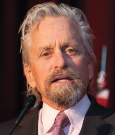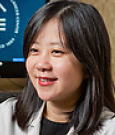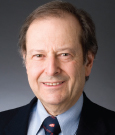Academy Award winning actor and producer Michael Douglas was the guest of honor at the opening day of the International Federation of Head and Neck Oncologic Societies (IFHNOS) 5th World Congress on July 27 in New York (see page 22 for more on the World Congress). He came not to plug the release of his latest film And So It Goes, but to talk about the devastating diagnosis of stage IV oropharyngeal cancer he received in 2010, which jeopardized not only his career but his life as well.
Mr. Douglas spoke after a video presentation by former President Bill Clinton and was introduced by his oncologist, Jatin P. Shah, MD, FACS, Chief, Head and Neck Service at Memorial Sloan Kettering Cancer Center in New York, Congress Chairman of IFHNOS, and Past President of the American Head and Neck Society.
His remarks before the more than 3,100 specialists in head and neck cancer in attendance at the conference appear below. Mr. Douglas’ speech has been edited for space and clarity.
It is a pleasure to be here and a privilege. I’ve always thought that speaking after a former President would mean that I’ve done something pretty extraordinary in life, but it turns out all I had to do was have cancer. Generally, when I’m on a stage at a prestigious event like this I’m accepting some kind of an award, so obviously today is a little bit different for me. Standing in front of 3,000 doctors, I’ll just be grateful to walk out of here without another prognosis of some sort.
In all seriousness and in every sense of the word, I’m very fortunate to be here today and I’m comfortable in saying that I owe most of that good fortune to the venerable field of head and neck oncology. And particularly to Dr. Shah, David Pfister, MD [Chief, Head and Neck Oncology Service at Memorial Sloan Kettering Cancer Center], Nancy Lee, MD [Radiation Oncologist at Memorial Sloan Kettering Cancer Center], and the main teams that helped and supported me at Memorial Sloan
Kettering.
Some of you might have heard of my case. I had stage IV oropharynx cancer. Even though I have played a doctor in my movies a couple of times, I’m ready to concede that you all certainly know much more than me just how many cases of oropharyngeal occurrences happen every year in the population and what the prognosis and treatments generally are. I think that’s what you all call medicine.
One of the ways my case was very similar to that of thousands of other cancer patients is that I was initially misdiagnosed. Not once, not twice, but three times. To you all, that is probably a familiar story. It all started out pretty innocently with a soreness of my gum behind my last molar. And being pretty diligent about my health, I went to see my general practitioner, who thought I had an infection and so was prescribing antibiotics, which, being a good patient, I took. And then I saw an ear, nose, and throat specialist, and then I saw a periodontist. But after a number of months when this supposed infection hadn’t gone away despite multiple rounds of treatment, I was pretty certain that this wasn’t simply just a sore gum.
Getting the Diagnosis
I was up in Canada with a friend who put me in touch with Saul Frenkiel, MDCM, FRCS(c), [Chair of the Department of Otolaryngology—Head and Neck Surgery] at McGill University and he examined me. We had one of those “uh, oh,” moments, which is never a good thing to hear from your plumber or mechanic, but is a really bad thing to hear from your doctor. And after confirming the diagnosis with a CT scan, Dr. Frenkiel and I started talking about what I was going to do next. I told him I would like to be treated in New York where I live so I could go back to my home every night. Dr. Frenkiel looked into who would be the right doctor for me to see and given my specific case and after checking with a few of his colleagues, he came back with one name, which had been unanimously recommended and that was none other than Dr. Shah.
Now, when I learned that I had stage IV cancer, I’m pretty sure that my eyes rolled into the back of my head and from what little I knew, this wasn’t good, and I think that was probably the scariest moment I faced. But it was then that Dr. Shah’s ability, not just as a surgeon, since fortunately I cannot attest to his expertise in that regard, but as what you would better think of a physician became very apparent to me. He said something, which I found so intelligent even in that very difficult moment or maybe because it was at a difficult moment that it mattered so much to me, which is, “We are going to think of this first as a cancer of the throat and not of the tongue, because as you know the throat we can treat one way and the tongue another.” And it was best to start with what we could hope for before turning to the darker question of surgery and what that would mean for me and my career.
But that was one of the things that I found over the course of my treatment at Sloan Kettering, there was always a positive note, never a false note and I knew that I was in the best possible hands, even if those hands were reaching down my throat more often that I would have liked. But there was a confidence knowing that not just Dr. Shah, but Dr. Pfister and Dr. Lee, who provided my chemotherapy and radiation treatments, as well as every layer of staff at the hospital, were in sync working to help me get better. And that allowed me to put [myself] in their hands and to do what I needed to do as a patient.
Going Through Treatment
Looking back on the experience I realized that you learn a few valuable things as a patient. One is that cancer is one of those things in life for which you will always want to hear the bad news first. Having stage IV cancer is pretty bad. Learning from Dr. Shah what stage IV cancer meant in the context of the head and neck was a little bad. And over the course of my treatment and my series of regular follow-up exams, things moved to the side of better and gradually even became good.
I went through 7 weeks of radiation and chemotherapy, which somehow seemed very accurately mapped to the seven cycles of hell, and each week I sank a little lower and I felt a lot worse. I had been given a choice of having a feeding tube put in my stomach, which would have had consequences for swallowing and taste later on or refusing that and dealing with that as best I could, which is what I did. And I did lose 40 pounds as a result. But I had been prepared for all that. The doctors and nurses at Sloan Kettering had warned me not to expect to feel great the moment those 7 weeks were over and that there would be another 5 weeks of feeling pretty awful until I could even hope to improve.
In the meantime, I was referred to a nutritionist who worked with me on a regular basis to help me maintain as much of my weight as possible. And [that was] something that made a great difference, not just with my physical health, but in giving me a sense of control and an involvement in what was happening and all of that was enormously important. Like a soldier, I prepared for battle, and from the outset I knew it was their job to treat me and they were among the best-trained and most capable medical teams on the face of this planet. And it was my job to toughen up and get ready for the treatment and later on for my recovery and that is what I was able to do.
Now, one of the other things I’ve learned as a patient is that how to distinguish a doctor is by seeing how many fellows and residents there are following behind him. So by this standard, it was quite clear that Dr. Shah was highly regarded. But as I thought more about this I realized that there is a lot of meanings in that correlation: doctors come to this department from all over the world to learn from one of the best in the field. Why? Because like any great science, medicine depends on the transfer and dissemination of knowledge to drive progress. Doctors have to know what works and what doesn’t. And they have to know who has tried this or that treatment so they don’t unnecessarily replicate it rather than trying something new.
Lessons Learned
To you, this is probably not a new point, but to me it’s an important one nonetheless. And maybe one of the most important things I learned through having and overcoming this disease is that cancer cannot be fought as a series of individual battles, but [rather] as a well-planned war in which all of us, both medical professionals like yourselves and patients like me, are allies.
Now, looking at things from this perspective, I realized that being misdiagnosed had nothing to do with whether or not I had good doctors. I had great doctors. What was missing in the equation was a simple bit of information that could have led my doctor to consider this one option, which to you as specialists is the area that might be pretty clear, but to doctors working in other specialties, it’s not. There is an obvious incumbency to share knowledge to learn from one another, doctors learning from doctors, patients from patients, and institution from institution. The role technology plays is especially important, not just in healing the body but in connecting medical communities to each other to make sure the latest advances reach every corner of the field. The International Federation of Head and Neck Oncologic Societies and the American Head and Neck Society and Memorial Sloan Kettering [Cancer Center] are powerful allies who every day push the field a little bit further, changing the way we understand head and neck cancer and not just saving the lives of countless patients, but improving the quality and effectiveness of their treatment [as well].
Advancing Knowledge About Head and Neck Cancer
And through your tireless efforts that spans nations, continents, cultures, and languages, and the courage you display in confronting something seemingly so implacable as cancer, you embody the essential values of cooperation, education, and the sharing of knowledge. The proposal made by the International Federation of Head and Neck Oncologic Societies to proclaim today, July 27, as the world head and neck cancer day is a right move to share and advance knowledge to the world by organizing educational activities each year on this day. I wholeheartedly support this proclamation. This is the road on which I believe progress lies and this, of course, is why you all are here today.
For a century, Memorial Sloan Kettering Cancer Center has helped lead the way in head and neck oncology, that century I can say, saved my life. With this room full of men and women like yourselves devoted to this field, pushing it forward with every case you take and each patient that you treat we can only imagine what the next century will bring. And short of that we can look around and we can say that something is working. I’m living proof of the progress this field is making and for that I can offer my wholehearted gratitude for your collective dedication and for your expertise and I want to thank you all very much for having me here today. ■





